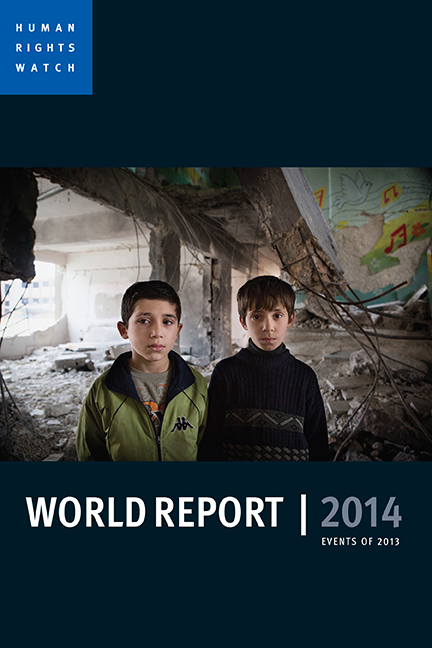Book contents
- Frontmatter
- Dedication
- HUMAN RIGHTS WATCH
- Table of Contents
- Foreword
- Rights Struggles of 2013: Stopping Mass Atrocities, Majority Bullying, and Abusive Counterterrorism
- The Human Rights Case for Drug Reform How Drug Criminalization Destroys Lives, Feeds Abuses, and Subverts the Rule of Law
- Putting Development to Rights: Integrating Rights into a Post-2015 Agenda
- The Right Whose Time Has Come (Again) Privacy in the Age of Surveillance
- Photo Essays
- AFRICA
- AMERICAS
- ASIA
- EUROPE AND CENTRAL ASIA
- MIDDLE EAST AND NORTH AFRICA
- UNITED STATES AND CANADA
- 2013 HUMAN RIGHTS WATCH PUBLICATIONS
- Acknowledgments
South Sudan
Published online by Cambridge University Press: 07 May 2022
- Frontmatter
- Dedication
- HUMAN RIGHTS WATCH
- Table of Contents
- Foreword
- Rights Struggles of 2013: Stopping Mass Atrocities, Majority Bullying, and Abusive Counterterrorism
- The Human Rights Case for Drug Reform How Drug Criminalization Destroys Lives, Feeds Abuses, and Subverts the Rule of Law
- Putting Development to Rights: Integrating Rights into a Post-2015 Agenda
- The Right Whose Time Has Come (Again) Privacy in the Age of Surveillance
- Photo Essays
- AFRICA
- AMERICAS
- ASIA
- EUROPE AND CENTRAL ASIA
- MIDDLE EAST AND NORTH AFRICA
- UNITED STATES AND CANADA
- 2013 HUMAN RIGHTS WATCH PUBLICATIONS
- Acknowledgments
Summary
South Sudan's second year as an independent nation was marked by political and economic uncertainty, violence in the eastern state of Jonglei, and ongoing repression of civil and political rights.
South Sudan and Sudan signed a series of agreements to resolve various out-standing issues in September 2012, but the relations between the two governments remain tense. Southern oil began flowing again through Sudan in April after a 2012 shutdown by South Sudan, but in June Khartoum threatened to stop transportation, accusing Juba of supporting rebels in its territory.
In July, President Salva Kiir dismissed his entire cabinet and appointed a new vice president and 21 new ministers, downsizing the cabinet from 28 ministries. In Jonglei state, an abusive government anti-insurgency operation against a rebel group in the area worsened brutal ethnic violence in 2013.
The government has not adequately responded to unlawful killings, arrests and detentions, and other human rights violations by its security forces. Lack of capacity and inadequate training of police, prosecutors, and judges give rise to numerous human rights violations in the administration of justice.
Legislative Developments
The South Sudan Legislative Assembly (SSLA) passed three media bills in July, including a Right of Access to Information bill, more than six years after the bills were drafted. President Kiir had yet to sign the bills into law at time of writing. Journalists hope the legislation will reduce unlawful arrests and harassment of media workers, including by officers from the National Security Service (NSS) who continue to operate without legal authority.
Kiir's cabinet endorsed the ratification of seven core international human rights instruments in early 2013, including the International Covenant on Civil and Political Rights. The SSLA ratified the African Charter on Human and Peoples’ Rights and the AU Convention Governing Specific Aspects of Refugee Problems in Africa, the UN Convention Against Torture and Other Cruel, Inhuman or Degrading Treatment or Punishment and the Convention on the Rights of the Child in late 2013, but others were still pending approval at time of writing.
South Sudan's first elections since independence are due in 2015, but preparations have lagged. The mandate of the National Constitution Review Commission, tasked with conducting broad consultation ahead of drafting a new constitution by January 9, 2013, was extended to December 31, 2014.
- Type
- Chapter
- Information
- World Report 2014Events of 2013, pp. 174 - 180Publisher: Bristol University PressPrint publication year: 2014



